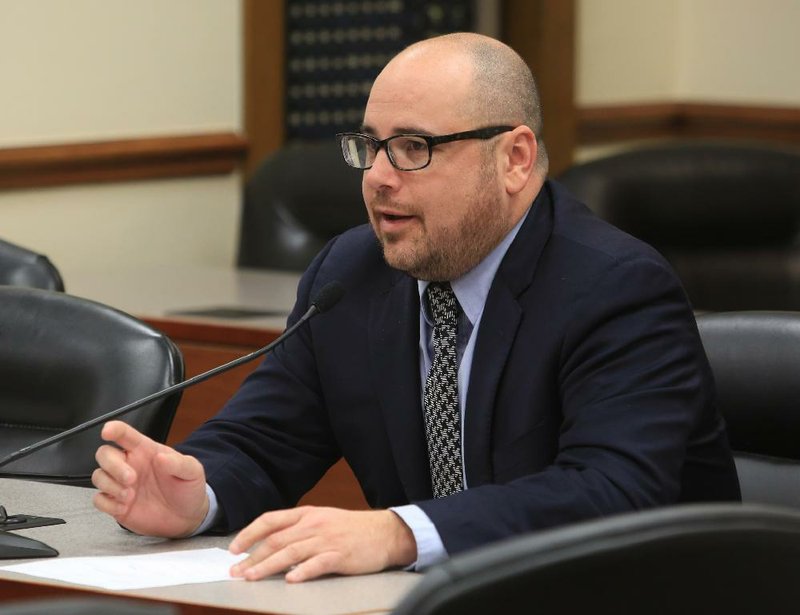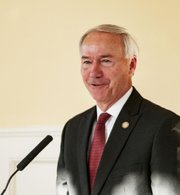Ending the election of Arkansas' Supreme Court justices would help limit the influence of campaign contributions and special interests on the state's highest court, say lawmakers who favor adopting a new selection process.
RELATED ARTICLE
http://www.arkansas…">Justices' ruling revisits big-donor issue
But as proposals develop for a new appointment-based system -- also known as merit selection -- new questions have emerged among those involved in the discussions over who would have clout in the selection of justices.
One proposal by the Arkansas Bar Association would set up a panel composed mostly of bar association members to make recommendations to the governor, according to people who have seen the draft.
But the Senate Judiciary Committee chairman, Sen. Jeremy Hutchinson, a Republican from Little Rock and the nephew of Gov. Asa Hutchinson, said the association's proposal would give too much influence to the group.
Earlier this year, Gov. Hutchinson said he supports ending the election of appellate court justices, but a spokesman said last week that the governor has not reviewed the bar association's draft.
The House Judiciary Committee chairman, Rep. Matthew Shepherd, R-El Dorado, has previously proposed a merit selection system with retention elections that would allow voters to decide whether to keep an appointed justice. Sen. Hutchinson said he favored removing all Supreme Court elections.
"It's a very significant issue," Shepherd said. "There are opinions all over the place."
Talk about ending judicial elections -- at least for appellate court seats -- began anew this year after out-of-state groups spent nearly $1 million on negative ads in two Supreme Court races. The subjects of the attack ads -- Justice Courtney Goodson and attorney Clark Mason -- both lost their races. (Goodson, who was running for chief justice, still has time to serve in her current term.)
Changing the state's judicial selection process would require amending the Arkansas Constitution through a popular vote, and both Shepherd and Sen. Hutchinson said earlier this month that they hoped to propose an amendment in next year's regular legislative session to put before voters in 2018. The session starts in January.
"There is no question that politics is going to be a part of the problem," said Joshua Silverstein, a law professor at the University of Arkansas at Little Rock. "The question is, what is the best way to minimize politics over the judicial selection process?"
Arkansas is one of 22 states that elects judges to its highest court, according to the National Center for State Courts. Judges are appointed in 26 states, 16 of which have retention elections. Virginia and South Carolina select judges by a vote of the Legislature.
Silverstein, who said he personally supports merit selection, said there is literature that shows retention elections cause judges to change the way they rule in years leading up to their retaining vote. He said some legal scholars support judicial elections.
"It's a complicated issue on which reasonable minds can differ," Silverstein said.
After concerns over campaign spending in the March Supreme Court races, the Arkansas Bar Association's House of Delegates formed a task force to study merit selection. The task force's June report recommended merit selection to reduce the influence of "dark money."
Dark money consists of contributions that buy advertisements in a political campaign, but the sources of the money are not disclosed.
The September draft proposal was based on the June report and was sent to members of the task force, including Shepherd and a lawyer for Gov. Hutchinson, said bar association president Denise Hoggard. Hoggard declined to release details about the draft, which members of the task force were asked not to release.
An Arkansas Times blog reported details of the draft on Oct. 7. Sen. Hutchinson said he had reviewed a copy and confirmed that the draft called for the formation of a nine-member commission to recommend justices to the governor.
The commission would consist of five members appointed by the bar association, two by the governor and one each by the House speaker and Senate president pro tempore. The commission would recommend three names from which the governor could chose to make an appointment. The discussions have focused on the Supreme Court and not the Arkansas Court of Appeals.
"Its plan is not going anywhere, and the bar association knows it, so they're going to go back and re-work it," Sen. Hutchinson said.
While supporting the idea of a nominating commission, Sen. Hutchinson said the bar association should not have the majority voice.
In a counterproposal, which Sen. Hutchinson said he has not formally drafted, the governor would submit five names to a commission, which could eliminate two nominees and rank the remaining three based on qualifications. The governor could chose from those three but would not have to follow the ranking. Sen. Hutchinson did not say what the makeup of the commission might be.
Referring to his uncle, Sen. Hutchinson said he trusts the current governor, but the commission's recommendations would provide accountability for future officeholders.
"You don't want some sycophant giving a lot of money to the governor to get appointed," Sen. Hutchinson said.
While he declined to discuss details about the bar association's draft as a member of the task force, Shepherd said he was concerned about proposed term lengths, and he still wants retention elections. The bar association's draft says justices would serve staggered 14-year terms, after which they could not be re-elected.
"Retention elections are an important component because it still allows the public some input," Shepherd said.
The idea of ending judicial elections is not popular with some lawmakers, said Rep. Clarke Tucker, D-Little Rock, who said he favors changing the state's disclosure requirements for political advertising rather than setting up a new system for selecting judges.
"I don't think it's politically viable. I think both sides know that people in Arkansas want their election rights," Tucker said.
Tucker's campaign finance law, House Bill 1425, passed in the lower chamber in last year's legislative session but died in the Senate. The law would have required any groups running radio or television ads about a candidate to disclose their contributors, and Clarke said he planned to introduce a revised version in the coming session.
Gov. Hutchinson has said laws aimed at campaign finance disclosure would likely run afoul of freedom of speech rights as defined by the U.S. Supreme Court's Citizens United decision. The governor said he expects to see merit selection proposed during the 2017 session.
During each regular session of the General Assembly, lawmakers may approve up to three constitutional amendments to appear on the ballot during the following election year. Tucker's proposal would be to change the current law.
SundayMonday on 10/16/2016



